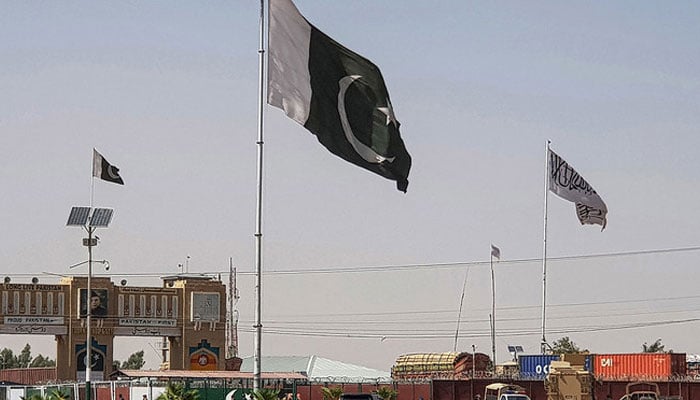Pak-Afghan tribal stakeholders’ dialogue
Islamabad:Ayaz Wazir, Pakistan’s former ambassador to Afghanistan, has said that challenges and tensions escalate when there are no conversations at any level of bilateral relationship and both sides refuse to resort to dialogue.
Wazir said this while chairing the 5th Round of ‘Pak-Afghan tribal stakeholders dialogue’ held in Peshawar, according to a statement issued here by Centre for Research and Security Studies (CRSS).
Wazir said that without open channels of communication, misunderstandings and mistrust flourish, exacerbating existing conflicts and creating new ones. Despite the numerous challenges jeopardising their relationship, both nations must prioritise negotiations and diplomatic interventions over military options, he continued.
He said that the issue of girls’ education lacks the focus and advocacy it deserves – especially by the broader Pakistani and Afghan societies who can help mobilise the much-needed pressure and citizens’ voices demanding to secure the future of Afghan youth and upholding their fundamental rights.
He opined that huge onus lies on the religious community whose scholars should engage and sit with the de facto Afghan leadership to understand the obstacles and concerns and come up with the solution that lives up to the Afghan nation’s aspirations.
The former ambassador said that efforts to empower female members of the society and educate them need to be taken and bolstered on both sides, especially in the border regions between Pakistan and Afghanistan which are yet to experience some serious developmental interventions.
“Pakistan and Afghanistan are conjoined twins and are never meant not to be separated. Both countries must stop the blame game and channelise and address their security concerns by strengthening their security against threats from terrorism and prioritise counter-terrorism cooperation,” he added.
Dr Qibla Ayaz, former chairperson, Council of Islamic Ideology (CII), noted that the influx of Afghan refugees into Pakistan particularly during times of conflict in Afghanistan should be seen as an international humanitarian obligation that Pakistan, as a neighbouring country facilitated Afghan refugees.
Dr Aamer Raza from University of Peshawar, emphasised the lack of trust between the two manifests in various forms, such as political disagreements, border tensions and mutual accusations where such distrust not only prevents meaningful cooperation in areas like trade, security, and cultural exchange but also exacerbates existing conflicts and creates new challenges. To bridge this trust gap, he suggested empowering ‘jirgas’ to play a more active role in conflict resolution and community governance. By revitalising and formally recognising these councils, both governments can tap into a culturally relevant and trusted mechanism for resolving conflicts, fostering dialogue, and building trust at the grassroots level, said Dr Raza.
The tribal leaders emphasised the importance of consulting and empowering them to effectively mitigate conflicts given their deep local influence and insights, making them crucial players in the peace-building process. They said that they may be uneducated in formal terms, they are far from uncivilised, their traditional wisdom and understanding of local dynamics are invaluable. Forming a committee of these tribal elders could facilitate the resolution of indigenous issues, leveraging their authority and knowledge to address conflicts at the grassroots level.
-
 Hailee Steinfeld Spills Her 'no-phone' Rule With Husband Josh Allen
Hailee Steinfeld Spills Her 'no-phone' Rule With Husband Josh Allen -
 Bowen Yang Gets Honest About Post SNL Life: 'It’s An Adjustment'
Bowen Yang Gets Honest About Post SNL Life: 'It’s An Adjustment' -
 Charlize Theron Delivers Strong Message At 2026 Winter Olympics Opening Ceremony
Charlize Theron Delivers Strong Message At 2026 Winter Olympics Opening Ceremony -
 Lil Jon Reacts To Son Nathan Smith's Death: 'Devastated'
Lil Jon Reacts To Son Nathan Smith's Death: 'Devastated' -
 Bianca Censori Reveals Where She And Kanye West Stand On Having Children Together
Bianca Censori Reveals Where She And Kanye West Stand On Having Children Together -
 Taylor Swift Hypes Olympic Athletes In Surprise Video Message
Taylor Swift Hypes Olympic Athletes In Surprise Video Message -
 Timothy Busfield Charged With Four Counts Of Child Sexual Abuse
Timothy Busfield Charged With Four Counts Of Child Sexual Abuse -
 Amy Schumer Explains Why Her Sudden Photo Surge Is ‘not A Cry For Help’
Amy Schumer Explains Why Her Sudden Photo Surge Is ‘not A Cry For Help’ -
 Kanye West First Contacted Bianca Censori While In Marriage To Kim Kardashian?
Kanye West First Contacted Bianca Censori While In Marriage To Kim Kardashian? -
 Travis Kelce Reveals What His Nieces Really Do When He, Taylor Swift Visit
Travis Kelce Reveals What His Nieces Really Do When He, Taylor Swift Visit -
 Lola Young Makes Career Announcement After Stepping Back From Touring
Lola Young Makes Career Announcement After Stepping Back From Touring -
 Priyanka Chopra Shares Heartfelt Message For Nick Jonas
Priyanka Chopra Shares Heartfelt Message For Nick Jonas -
 Spotify, Major Labels File $13b Lawsuit Over Alleged Music Scraping
Spotify, Major Labels File $13b Lawsuit Over Alleged Music Scraping -
 Travis Kelce Opens Up About Being Backup Plan For His Nieces
Travis Kelce Opens Up About Being Backup Plan For His Nieces -
 Winter Olympics 2026: Chinese Robot Dance Goes Viral In Milan
Winter Olympics 2026: Chinese Robot Dance Goes Viral In Milan -
 Jessica Biel Urged To Divorce Justin Timberlake?
Jessica Biel Urged To Divorce Justin Timberlake?




